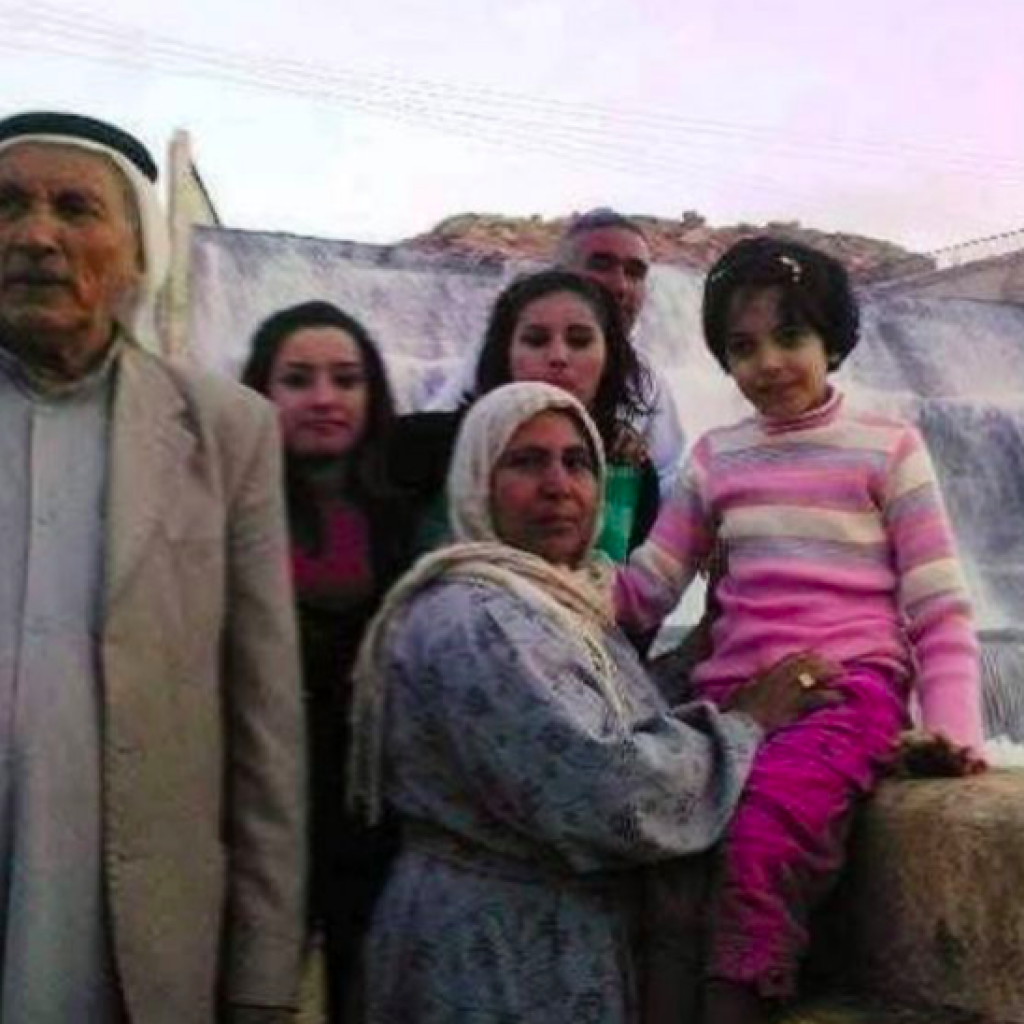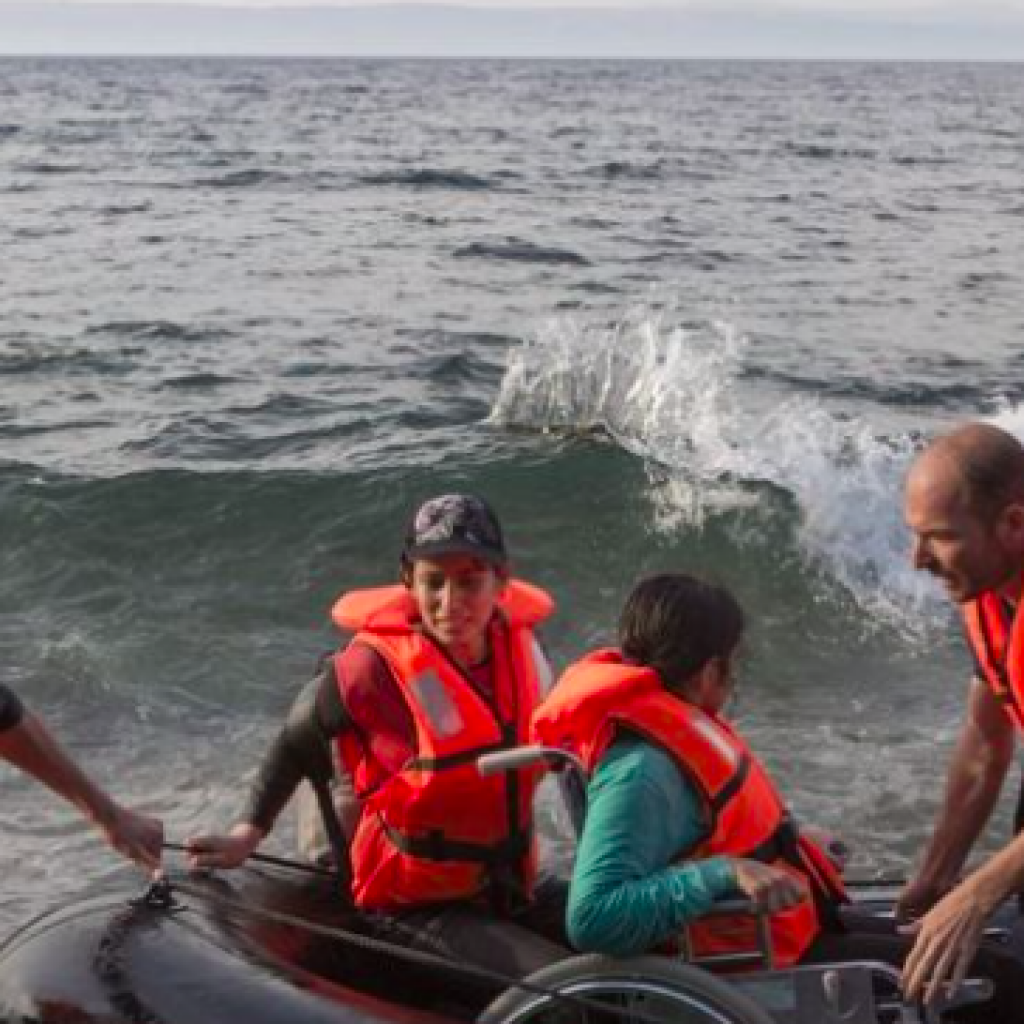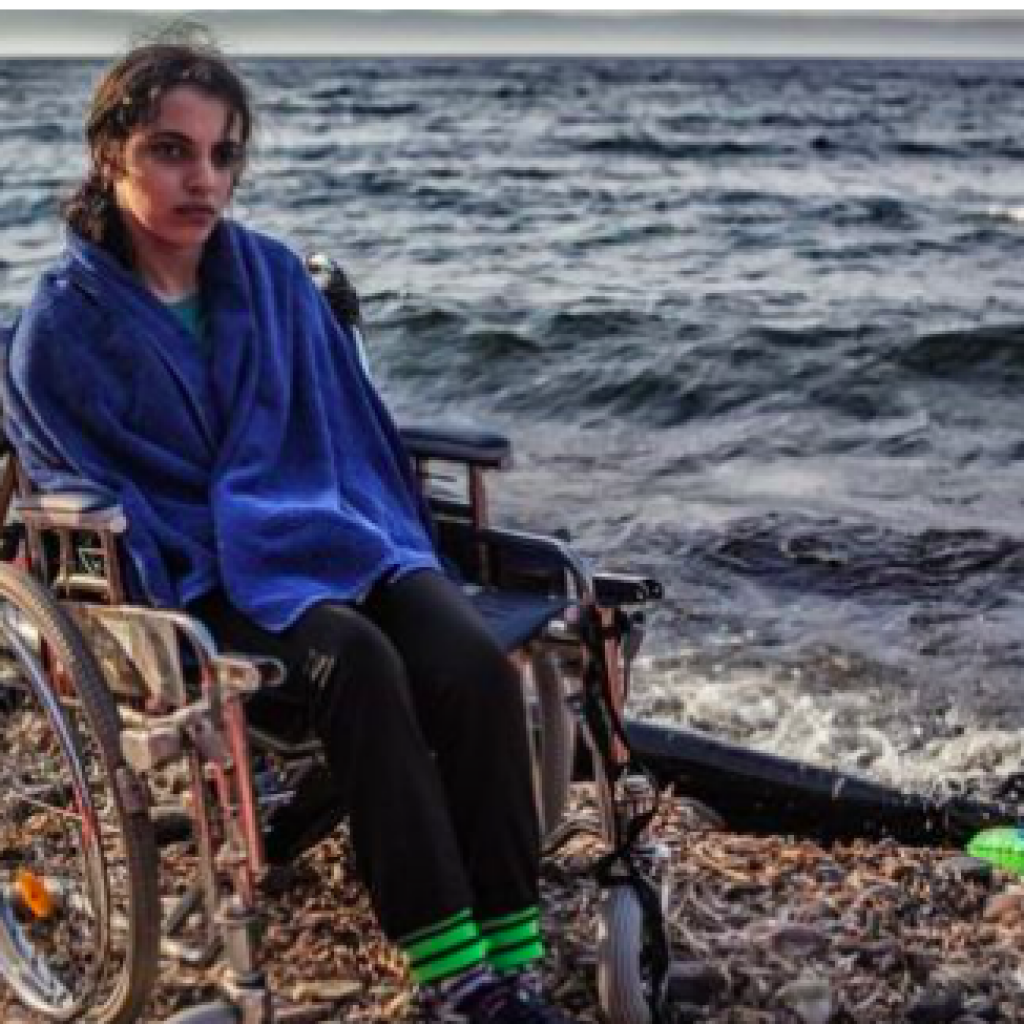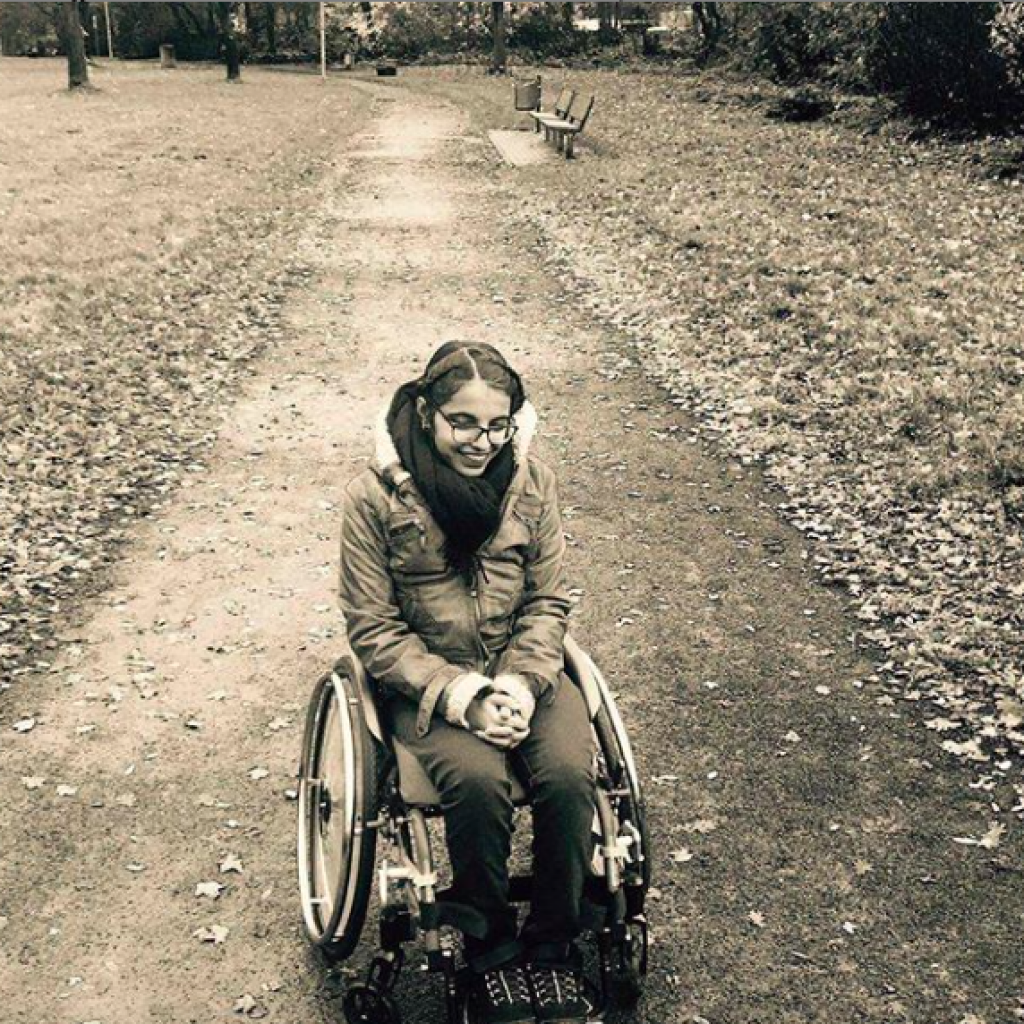Inspiring Story of “the Girl from Aleppo”: she Crosses 8 Countries in Wheelchair
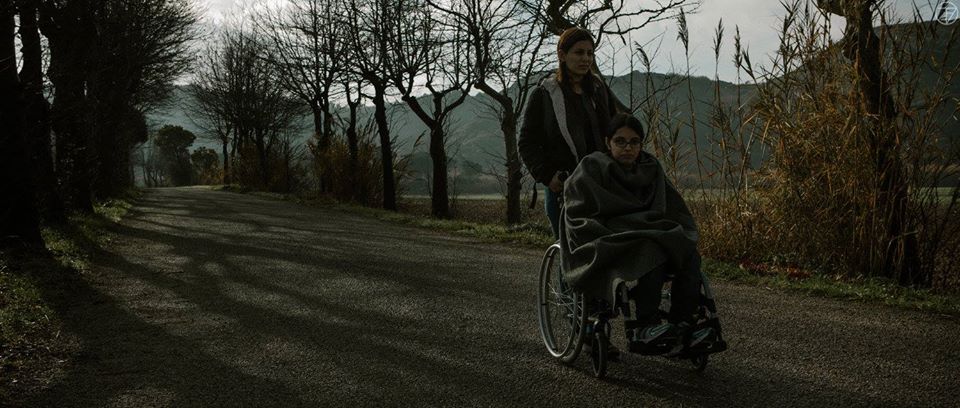
Coming back from the dead; that’s not hard. You know what’s hard? Getting from Syria to Germany by crossing 8 countries in a wheelchair.” This sentence was uttered by the main character of Days of Our Lives (DOOL), an American daytime soap opera broadcast, referring to Nujeen Mustafa, a disabled Syrian. Comedian John Oliver used his premium cable clout to shoot a DOOL closing scene just for Nujeen.
But this time, the main actor will not die, and the ending that saddened Nujeen will change to become a happy ending — one that is similar to that of Noujain’s journey in her wheelchair in late 2015. The girl, who was not more than 15 years old by that time, had a happy ending to a dangerous adventure for a girl at her age.
It is not only the adventure that deserves to win all that tremendous admiration, but also the details of Nujeen’s life and the challenges she faced and made her become one of BBC’s 100 inspiring and influential women from around the world for 2018.
In this interview with Tiny Hand, 21-year-old Kurdish Nujeen will take you on a journey through her life and present a perfect model of inspiring stories.
Let’s start with the first station
Location: The 5th floor in an old building, Sheikh Maqsood neighborhood in Aleppo.
Date: Before 2012; that is, before the outbreak of the Syrian war.
Age: 10 years.
At that house, the young woman taught herself by herself. Suffering from paralysis, she could not be enrolled in a school. And self-study was the only option she had to gain knowledge.
“I learned English by watching the American broadcast, Days of Our Lives. I also read a lot of science books, novels, and short stories,” she said.
“I’m a Kurdish girl with special needs. I’m a dreamy person with a passion for learning, curiosity, and big dreams that I seek to achieve,” Noujain told Tiny Hand to describe herself in brief.
Indeed, this is what Nujeen exactly did when she decided to take the first big step towards achieving her dream!
Now we move on to the second station
Location: Turkey, Greece, onto Germany.
Date: 2015. That is, two years after war erupted in Syria.
Age: 15 years.
In this year, as events escalated in Syria, many Syrians decided to leave the country and migrate illegally to Europe.
Nujeen was one of these Syrians. Together with her elder sister, she made an irrevocable decision to migrate illegally. In her company was not only the sister, but also her wheelchair.
“Before embarking on that adventure, I hadn’t used the wheelchair extensively, but my relationship with it developed throughout the journey. It served as a car, a means of transportation, and a part of my life that I am proud of because it distinguishes me from others,” Noujain narrated.
In this wheelchair, Nujeen climbed on a rubber boat from Turkey towards a Greek island. It accompanied her in each and every moment of horror. Its wheels spun through thousands of kilometers to reach Germany where she became a refugee and lives up till today. She started a new phase of her life in Germany. “Here, I’m not treated as an inferior person because I use this wheelchair,” said Noujain.
Now comes the third station: the beginning of dream fulfillment
Location: Cologne, Germany
Date: 2018
Age: 16 years
A year after Nujeen’s arrival in Germany, she published two books she co-authored with British journalist and writer Christina Lamb, narrating her Aleppo-Germany journey.
“I felt I shoulder a heavy responsibility to talk about the situation in Syria, the things that make me different from others because of my disability and my Kurdish origin, as well as my experience during the journey,” Noujain expressed.
Indeed, it was this trip that drew many people’s attention to her and made her worthy of tremendous admiration.
In 2019, the young woman became the first disabled person to brief the United Nations Security Council about her experience during the Syrian war and the policy pertaining to the disabled people.
In February 2019, the Kurdish girl received the Allison Des Forges Award for Extraordinary Activism from Human Rights Watch.
What is most significant of all was “the healthcare and services” she received. “The situation for the disabled people here is quite different,” Noujain emphasized.
She has never regretted for a moment that she sought refuge in Germany. It was in this country that she went to school for the first time in her life, and today she is seeking a bachelor’s degree.
Last station in the interview between Nujeen and Tiny Hand
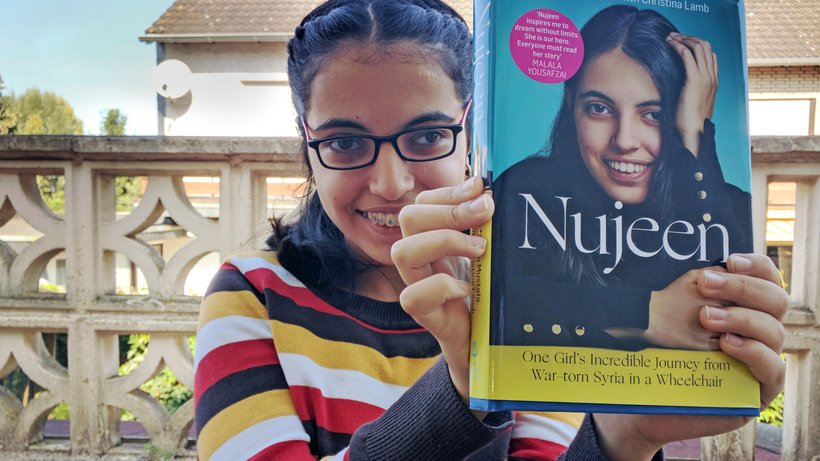
At the end of the interview with Noujain, we asked her the following questions:
What is the most beautiful quotation in your book entitled “A Girl from Aleppo“?
“War histories usually glorify military leaders, presidents, or people in power although the latter are the cause of war tragedies. War victims, however, are usually forgotten or simply mentioned as mere numbers and statistics of causalities. In my book, there is a paragraph that talks about this very issue and I consider it to be my favorite part.”
What is the thing you miss the most in Syria?
“The intimacy and warmth of the Syrian society. There is nothing of this sort here in Germany. I long for our relatives who stayed in Syria. I’d like also to add my nostalgia for the Syrian cuisine. I don’t like the German food!”
What is your dream?
“I wish I can be able to bring the voices of refugees and people with special needs to the world and to affect their lives even if slightly.”
What would you say to all children, especially refugees, about what they are going through? How can they face the war-imposed challenges?
“Although the situation is gloomy and miserable, just as they see it, I would like to tell them to continue what they are doing, believe in themselves, and optimize all the available potentials. Every child needs to believe in his or her abilities. Every child is a special person. No one comes to this world just as a number. Everyone has a role to play and an impact to make, however limited in size or scope.”
What are your future projects? Is there a new book you are working on?
“Yes, there are some upcoming projects, but I cannot talk about them right now. I will, however, disclose them in October.”
Tags
Related Posts
Surviving war in Damascus
In the heart of Old Damascus,, where life is marked by challenges and hardships, lives Maya. At just 14 years old, she carries burdens far beyond her years. Surviving war in Damascus Maya's Journey: Becoming the Strength of My Family Through Collecting Cardboard Enter keywords…
March 10, 2025Tiny Hands, Heavy Burdens: A Child’s Life on the Construction Site
At five in the morning, we met Issa in his modest, rural home in al-Karamah area of the Raqqa countryside. The early breeze bit into our faces as Issa finished breakfast with his brothers and father. Dressed in a red shirt, he had pulled on a light cotton jacket to shield himself from the morning chill….
March 10, 2025
